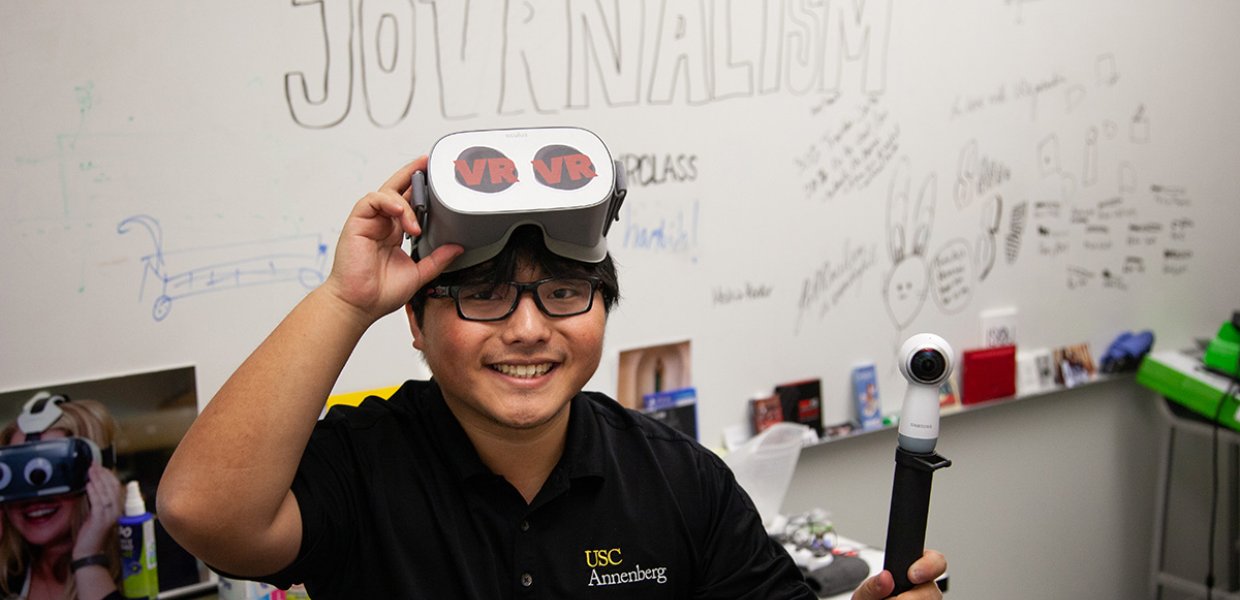Even before Ruby Yuan set foot on campus, he knew what type of education he wanted to get. The journalism major, who will be graduating in 2020, was interested to find the intersection between journalism and technology and he knew USC Annenberg was the place to explore this.
“Three days before I came to Annenberg, I read a piece about Syrian refugees and virtual reality,” Yuan said. “I was like, how cool would that be if I could somehow persuade my school to make a journalism class about VR?”
During the new student assembly that year, Robert Hernandez, associate professor of professional practice, introduced himself and his JOVRNALISM — the “VR” stands for virtual reality — class to the new cohort of undergraduates.
Yuan was hooked — and has been ever since. Yuan, who is also the executive editor of Annenberg Media this year, has been named the first Emerging Technologies Fellow at USC Annenberg, an opportunity funded by the Heeger Brothers’ Fund. The fund was established by USC alumni Robbie Heeger (BA, broadcast and digital journalism, 2012) and Adam Heeger (BA, business administration, 2011). Robbie Heeger took Hernandez’ class while in college, and through this gift, he and his brother wanted to help connect journalism students with the changing technological landscape while increasing awareness of the JOVRNALISM program and power of virtual reality storytelling.
“Ruby embodied what I envisioned for this fellowship: someone who is genuinely passionate about it,” said Hernandez, who is overseeing the gift. “He is phenomenal in terms of his work and his integrity and how he represents Annenberg. He lives and breathes this school to an obsessive level.”
Yuan’s commitment to exploring how to merge technology with journalism began his very first year at USC Annenberg. He took a course with Laura Davis, assistant professor of professional practice, called “Journalism for Mobile and Emerging Platforms,” where he learned to tailor news to different platforms. After finishing his core journalism requirements, he went on to take Hernandez’s JOVRNALISM class twice — and he plans to take the class a third time in the spring.
“When I first took the class, my thought was that I wanted to look at the future, maybe 20 years or even longer down the road — that was my goal,” Yuan said. “I was trying to take a peek at what the future of journalism would look like. But after I took his class, what I realized is, it’s coming faster than I thought.”
In the JOVRNALISM course, which focuses on producing journalism using emerging technologies such as virtual reality, augmented reality, 360-degree cameras, photogrammetry, videogrammetry, Yuan had the chance to work on projects exploring homelessness and climate change. Both projects, he believes, took on a whole new level of impact because of the immersivity of the technology.
The projects allowed the students to work closely with the groups they were reporting on, helping the subjects to tell their own stories.
“Instead of coming into the homeless community with stories, we gave them a platform,” Yuan said. “We taught them how to produce the video, and we asked them to come up with what stories they wanted to tell. We told them, ‘We are here to help you put your voice out.’”
Yuan’s interests haven’t stopped at virtual and augmented realities. He’s also had the chance to take 3D modeling and 3D animation classes in the School of Cinematic Arts to broaden his understanding of different technologies.
Now, a few months in, the support from the fellowship has been keeping Yuan busy. He has attended two conferences, one for the Online News Association in New Orleans and the other for Oculus Connect 6 in San Jose. Yuan said what he’s learned about emerging technologies through USC Annenberg prepared him for these conferences, enabling him to have productive and in-depth conversations there with attendees from the Washington Post and PBS.
“There are not that many people who are leaning into the next disruption,” Hernandez said. “It's an opportunity to really empower students. We stand out compared to other news organizations such as The New York Times and the Washington Post, because we have a solid understanding of the benefits of these technologies and how to use them. That's the goal: to amplify the reach of what we do and to let people know they can do it, too.”
Yuan’s focus before graduation is to continue spreading information about virtual reality and augmented storytelling to students, by both speaking to classes and letting them experiment with the equipment.
“One of my goals is to facilitate more communication about the emerging technologies, on how it will impact the news industry, and how the news industry can use it,” Yuan said. “I want to create conversations within the school — there are so many benefits to talking about it.”
